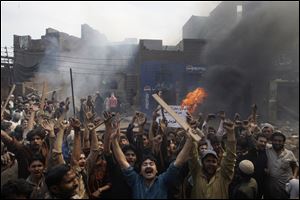
COMMENTARY
Christian, Muslim minorities in Pakistan are targets of terrorism
3/18/2013
A mob in the eastern Pakistani city of Lahore attacked a Christian neighborhood March 9 and set fire to homes after hearing accusations that a Christian man had committed blasphemy against Islam's Prophet Mohammed.
PESHAWAR, Pakistan — Pakistan has been the target of terrorism on a bigger scale than in many other countries. When there is yet another act of communal, sectarian, or political terrorism, the targets of such wanton acts are all Pakistanis.
Two unrelated acts of terrorism recently occurred in Pakistan. Both happened on the same day in different parts of the country.
The first was a bomb blast close to my residence in the city of Peshawar. Planted in a small mosque, the bomb was set off during an early afternoon prayer service. It killed eight people, including the imam and a few children. Thirty others were injured.
The mosque is in one of the labyrinthine alleys of this city. I have often used the alley as a shortcut. It was literally and figuratively close to home.
The other atrocity was committed against Christians in the city of Lahore, 300 miles southeast of here. A mob of self-righteous Muslims torched the houses of Christians in the Badami Bagh section of the city.
The carnage was sparked by some loose talk between two drunken friends — one Muslim, the other Christian. The Christian is alleged to have uttered insulting remarks about Prophet Muhammad. As the news spread, a mob of Muslim vigilantes gathered in the Christian neighborhood, ordered residents out of their homes, and set the neighborhood on fire.
The root of this terrorism lies in the Draconian anti-blasphemy law that was enacted by military dictator Zia ul-Haq in the 1980s. An orthodox zealot, he passed the law to appease religious political parties. Conviction under the law carries a long prison term or the death penalty. Some Muslim zealots have used the law to settle personal scores or to force Christians off their land. Many cases of blasphemy against Christians were thrown out of court as fabrications.
Official response to this tragedy was predictable. Authorities condemned it and announced monetary compensation as well a promise to rebuilt burned houses. Unfortunately, there is seldom any permanence to their concerns.
Soon after the money is distributed and houses are rebuilt, authorities settle down to business as usual. An inquiry commission that formed after a similar incident in Gojra in 2009 has yet to make its findings public. No one has been punished for that incident.
In a 1992 meeting with then-Pakistani prime minister Nawaz Sharif, I brought up the issue of protection of minorities. A few months earlier, a church had been burned in Punjab. The prime minister said his government had compensated the displaced people and would pay to rebuild the church.
When I pressed him on what the government was doing to prevent repetition of such incidents, he had no credible answer.
The problem seems to be the blasphemy law. Any attempt to repeal it is met with fierce opposition by religious parties. After one such incident against Christians in 2011, Salman Taseer, the governor of Punjab, was gunned down by his own bodyguard for advocating repeal of the law.
The Supreme Court of Pakistan appears to be the only institution that stands firm against government’s inaction. It holds provincial and federal government officials accountable. Soon after the recent incident, the court said it will look into the incident and those responsible for not confronting the mob.
Pakistani minorities have not fared well under civilian governments. This sense of vulnerability prevails among Muslim minorities as well. The recent spate of killings of Shias in Karachi and Quetta, as well as sporadic violence against the Ahmadis, has torn the fabric of communal harmony.
People here talk longingly of the time, in the not too distant past, when Pakistan’s Muslim majority and minorities of different faiths lived peacefully with each other. Since the Soviet invasion of Afghanistan in 1979 and the subsequent rise of Islamic fundamentalism, fueled by measures taken by Saudi Arabia and the United States against the Soviets, the landscape has changed.
Unfortunately, there appears to be no solution in sight.
Dr. S. Amjad Hussain is a retired Toledo surgeon whose column appears every other week in The Blade.
Contact him at: aghaji@bex.net